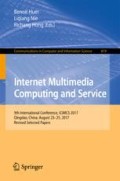Abstract
Based on the reconstruction idea of auto-encoder (AE) and image reconstruction, we present a new idea that the classical auto-encoder can be polished up by supervised learning. We also present a novel supervised deep learning framework for damaged face reconstruction after analyzing the deep model structure. The proposed model is unlike the classical auto-encoder which is unsupervised learning. In this paper, the deep supervised auto-encoder model is illustrated, which has a set of “progressive” and “interrelated” learning strategies by multiple groups of supervised single-layer AE. In this structure, we define a Deep Supervised Network with the supervised auto-encoder which is trained to extract characteristic features from damaged images and reconstruct the corresponding similar facial images, and it improves the ability to express the feature code. Extensive experiment on AR database demonstrates that the proposed method can significantly improve the smoothness of the damaged face reconstruction under enormous illumination, expression change. Experiments show that the proposed method has good contribution and adaptability to the damaged face reconstruction.
Access this chapter
Tax calculation will be finalised at checkout
Purchases are for personal use only
References
Hong, R., Hu, Z., Wang, R., et al.: Multi-view object retrieval via multi-scale topic models. IEEE Trans. Image Process. 25(12), 5814–5827 (2016)
Hinton, G.E., Osindero, S., Teh, Y.W.: A fast learning algorithm for deep belief nets. Neural Comput. 18(7), 1527 (2006)
Bengio, Y.: Learning deep architectures for AI. Found. Trends Mach. Learn. 2(1), 1–81 (2009). S1935-8237
Zhang, C., Zhang, Z.: Improving multiview face detection with multi-task deep convolutional neural networks. In: Applications of Computer Vision, pp. 1036–1041. IEEE (2014)
Längkvist, M., Karlsson, L., Loutfi, A.: A review of unsupervised feature learning and deep learning for time-series modeling. Pattern Recogn. Lett. 42(1), 11–24 (2014)
Deng, Y., Li, D., et al.: Partially occluded face completion and recognition. IEEE International Conference on Image Processing, pp. 4145–4148. IEEE (2010)
Deng, Y., Dai, Q., et al.: Graph Laplace for occluded face completion and recognition. IEEE Trans. Image Process. 20(8), 2329–2338 (2011). A Publication of the IEEE Signal Processing Society
Pathak, D., Krahenbuhl, P., et al.: Context encoders: feature learning by inpainting. In: IEEE Conference on Computer Vision and Pattern Recognition, pp. 2536–2544. IEEE Computer Society (2016)
Hong, R., Zhang, L., Zhang, C., et al.: Flickr circles: aesthetic tendency discovery by multi-view regularized topic modeling. IEEE Trans. Multimed. 18(8), 1555–1567 (2016)
Hong, R., Yang, Y., Wang, M., et al.: Learning visual semantic relationships for efficient visual retrieval. IEEE Trans. Big Data 1(4), 152–161 (2017)
Yang, C., et al.: High-Resolution Image Inpainting Using Multi-scale Neural Patch Synthesis (2016)
Huanga, R., Chang, L., et al.: Adaptive deep supervised autoencoder based image reconstruction for face recognition. Math. Probl. Eng. (2016)
Yeh, R., Chen, C., Lim, T.Y., et al.: Semantic image inpainting with perceptual and contextual losses (2016)
Denton, E., Chintala, S., Szlam, A., et al.: Deep generative image models using a Laplacian pyramid of adversarial networks 2015, 1486–1494 (2015)
Radford, A., Metz, L., Chintala, S.: Unsupervised representation learning with deep convolutional generative adversarial networks. Comput. Sci. (2015)
Rumelhart, D.E., Hinton, G.E., Williams, R.J.: Learning representations by back-propagating errors. Nature 323, 533–536 (1986)
Pearson, K.: Mathematical contributions to the theory of evolution (III): regression, heredity, and panmixia. Philos. Trans. R. Soc. London. Ser. A Contain. Pap. Math. Phys. Character 187, 253–318 (1895)
Author information
Authors and Affiliations
Corresponding author
Editor information
Editors and Affiliations
Rights and permissions
Copyright information
© 2018 Springer Nature Singapore Pte Ltd.
About this paper
Cite this paper
Rui, T., Zhang, S., Zou, J., Zhou, Y., Tang, J. (2018). Deep Auto-Encoder Based on Supervised Learning for Damaged Face Reconstruction. In: Huet, B., Nie, L., Hong, R. (eds) Internet Multimedia Computing and Service. ICIMCS 2017. Communications in Computer and Information Science, vol 819. Springer, Singapore. https://doi.org/10.1007/978-981-10-8530-7_28
Download citation
DOI: https://doi.org/10.1007/978-981-10-8530-7_28
Published:
Publisher Name: Springer, Singapore
Print ISBN: 978-981-10-8529-1
Online ISBN: 978-981-10-8530-7
eBook Packages: Computer ScienceComputer Science (R0)

